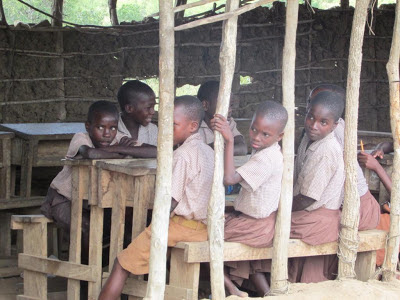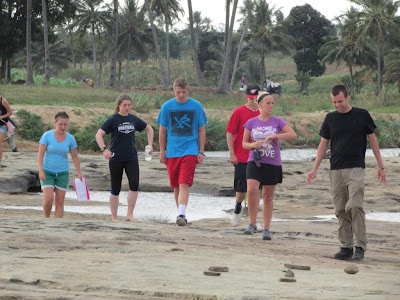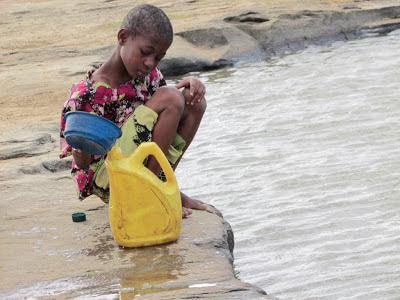 When Judith Lambertson
traveled to Tanzania earlier this year she thought she'd return home with some
fun memories, a camera full of safari photos and great inspiration for her
paintings. When she began interacting with members of a local Maasai tribe, however,
the focus of her trip shifted completely. As she learned more about the
devastating impact of scarce and contaminated water sources, Judith knew she
had to do something. Read more below about Judith and how she's managed to raise over
$1000 in just a few months.
When Judith Lambertson
traveled to Tanzania earlier this year she thought she'd return home with some
fun memories, a camera full of safari photos and great inspiration for her
paintings. When she began interacting with members of a local Maasai tribe, however,
the focus of her trip shifted completely. As she learned more about the
devastating impact of scarce and contaminated water sources, Judith knew she
had to do something. Read more below about Judith and how she's managed to raise over
$1000 in just a few months.
Judith had always dreamed of going on an African safari. “I expected it
would be about seeing the animals,” she explains, “But it turned out to be so
much more.” While in Tanzania, Judith visited a rural school, attended almost
entirely by children from the local Maasai tribe. Each member of her group was
assigned a child to shadow for the day. “At first I thought she was a little
boy,” Judith laughs, “Her hair was shaved so short! There weren’t many girls at
all in the class, just a few.” Judith spent the morning sitting with this
little girl. “She was so sweet,” Judith remembers, “And all the kids absolutely
loved school.” Judith was impressed with how neat the girl’s notes were, “She
was a good little student. She had check marks and “Nzuri” (good) written everywhere.” Judith quickly realized,
however, that this little girl did not want to smile. Her teeth were rotten and
brown and she was ashamed to let others see them. And she wasn’t the only one.
Almost all of the students had rotting teeth.
Deeply touched by the students and teachers, Judith asked her guide, a
member of the Maasai tribe himself, why so many of the Maasai people she’d met,
including the guide himself, had rotting teeth. He explained it was a side
effect of the contaminated water they were forced to drink every day. “There
were no other options for them,” Judith explained. Their nearest water source
was likely a small pond or waterhole several miles away. There were so few
girls in the class because most of the girls in the community spent hours every
day fetching contaminated water with their mothers.
When Judith returned home to Connecticut she couldn’t forget the
incredible struggle people faced in simply obtaining water. She wanted to learn
more. “I didn’t know about the mortality and the water-borne diseases until I
started to read about it,” Judith admits. “The more I learned, the more
important it felt to do something. When I heard that babies die from
water-borne diseases it made me want to be involved even more.” Motivated to
make a difference, Judith began searching for a good organization to support.
When she discovered WHOlives she liked that WHOlives focused on “more than just
giving water” and felt our model “made a lot of sense.” After deciding to give
a monthly donation, Judith still wanted to do more. “I really want to feel like
I’m making something happen,” Judith explains, “I want to have a direct
involvement.” With a deep desire to improve lives, Judith set a goal to raise
enough money to fund a well, bringing clean water to a Maasai community in
Tanzania.
 |
| Judith's "Maasai Warrior" |
In just a few months, Judith has already made incredible progress
towards her goal. Reaching out to friends and acquaintances, Judith shares her
story and her passion for clean water with those around her. She actively
invites others to donate along side her and help her in building a well for the
Maasai people. She’s also put her artistic talent to good use. After returning
home, Judith painted several watercolors inspired by her trip. Sharing the
wonderful people she met and the various animals she saw while on safari,
Judith uses her paintings to start conversations about the water crisis. She’s
also had her paintings digitized and made into beautiful note cards which she
sells at her art shows. She donates all the proceeds towards her well project
with WHOlives.
”It’s not always easy,” Judith confesses, “I’ve never done this before
and I’m not the kind of person who could ask people for anything.” When asked
how she overcomes her fear, Judith explains, “The biggest thing is just opening
my mouth.” Once she takes that first step, it’s not so scary anymore. She says
it’s easiest to share her story with those she’s already comfortable with.
She’s found many of her friends want to get involved simply because they care
about her and they know clean water is important to her.
Judith feels wonderful every time someone decides to donate or buy her
note cards. “I’m always so happy and proud,” she says, “It makes me feel like
I’m doing something worthwhile.” Judith often gets emotional when she talks
about the little schoolgirl she met and her struggle for clean water. For
Judith, raising money for clean water is a way to help make the world a better
place for women and children in need.
 |
| Judith's "Two Zebras" |
To help Judith reach her goal to provide a well to a Maasai community, visit www.wholives.org/donate.php
and select your desired giving level and frequency (one-time or monthly). Be
sure to enter “Judith” as the WIN number so we know to direct your donation
towards her well project. For monthly donations, WIN numbers can be entered
directly on the WHOlives donation page. With one-time donations, the option to
add a WIN number appears on PayPal’s donation confirmation page.


























































